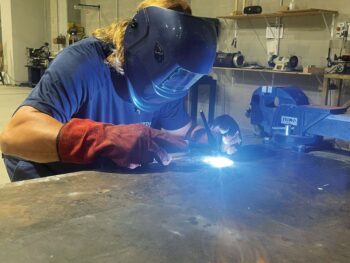Your Local Broker, Internationally
Berthon UK
(Lymington, Hampshire - UK)
Sue Grant
sue.grant@berthon.co.uk
0044 (0)1590 679 222
Berthon Scandinavia
(Henån, Sweden)
Magnus Kullberg
magnus.kullberg@berthonscandinavia.se
0046 304 694 000
Berthon Spain
(Palma de Mallorca, Spain)
Simon Turner
simon.turner@berthoninternational.com
0034 639 701 234
Berthon USA
(Rhode Island, USA)
Jennifer Stewart
jennifer.stewart@berthonusa.com
001 401 846 8404
Yachting & the Supply Chain
By Sue Grant
Although 2021 was dominated by Covid, its affect also created shortages and supply chain issues that have now fundamentally been embedded as a result of inflation and the recent geopolitical squeeze on energy and commodities; this now touches all parts of life.

Lorry drivers voted with their feet, unwilling to put up with poor pay, lack of facilities and lack of respect. They were rightly cross about the small number of decent places to pull off the road whilst they ply their trade, delivering everything from avocados to raw materials for manufacturing. Governments are encouraging transport companies to make amends, solve these problems and to train more drivers – but these are not short term fixes. Luckily, substantial pay rises have taken place to recover competitive reductions we suffered in UK over many years and thus more supply to replace the ex-migrant return to EU basecamp. Nevertheless, transport worldwide has seen many other issues. The perfect storm afloat!
At the same time, shipping prices have shot up with container transport costs multiplying and so we have seen supermarket shelves denuded and the wait time for the most pedestrian of goods as shortages have bitten.
The lockdown of Planet Earth because of Covid has been a real problem with manufacturing grinding to a halt, and where it has kept moving, shortages of staff due to illness and allocation of resource to very properly battle with the Pandemic. As the world started to turn once again, further issues were injected into the system by various autocratic states; hence, it will continue to take time for the supply chain to gear up and reach normal levels.
In the 21st Century, it was the norm to stock very little as supplies could be obtained at the click of the fingers, or rather the click of a mouse. No more, and so now, businesses have had to re-learn (and find the additional cash flow) to have sufficient materials in stock to keep running. On-shoring is the new by-word as distant manufacturers battle with wise western demand for less delivery miles.
Some say the perfect storm might exacerbate Brexit, but the EU is also struggling with its lack of diplomacy risk assessments that have created an addiction to autocratic Russian energy. However, recent pleas to the Middle Eastern autocratic by the UK seems to rely upon a longer Royal relationship than the West has with Putin. The World is certainly changing and changing fast.
Whilst it is super important that we look to environmental controls to give our poor planet a break, the New Now needs the West to wean itself from Gas, and new regulations have added another dimension to this pressure point. The latter is predicated to be unavoidable as the planet cannot wait for us to sort out our supply chain issues and needs all the immediate relief that we can offer it.
All in all, more than a perfect storm and one which the yachting industry has had to deal with in the same way as every other industry across the globe.
People have yachts for pleasure, a home from home in their leisure time, a fantastic activity that takes them away from the cares of everyday life. Because of Covid-19, more clients are WFH – or should we say, WFY – as they seek to be aboard their yacht with good communications make this a practical reality. This means that there is pressure to ensure that yacht owners arrive at a yacht that is fully operational with all the needed service and upgrades completed. In many cases, we have seen our clients use their yachts for longer than would have been the case pre-Covid-19. Partly to make up for the lost season for 2020 where so many yachts spent the summer out of commission with their owners in lockdown far away.
However, with the experience of lockdown, quite understandably, the charms of the safety and fun offered by a yacht has become more important. There has also been a curb on other activities and in many cases anxiety about the safety of going back to other sports and activities where there are many other people in close proximity. Yachts have become a larger part of their owners’ leisure – and work from home – programme.
This has put enormous pressure on maintenance yards and service facilities. Both our sister company Berthon Boat Co in the UK, with around 100 skilled craftsmen on the shop floor and our refit facility in Palma at Berthon Spain have had to deal with these pressures in order to deliver working, gleaming and refitted yachts to our client base in the face of a swathe of operational difficulties. Our clients are wonderful, but we do understand that talk of supply chains under pressure butters absolutely no parsnips when it comes to delivering a finished yacht on time for a planned programme that has probably been in the works since lockdown in 2020. Turning yachts away has become common and the lack of labour at the drop of a hat owing to either Covid isolations or recruitment moves, still creates havoc.
The shortages have been with the basics – resin – for example is in short supply. This is a very unglamorous yet essential material for boatyards and boat builders across the planet. Who could have conceived that, not only would the price rocket, but also that even then it would be in such short supply? Pre Covid it would have been unthinkable. Acetone is another equally boring but essential tool in a boatyard’s armoury. It is worth taking a minute to think on how a boatyard copes with these 2 materials in short supply. It’s rather like making scones with no flour.
Raw material prices for steel, stainless, copper and the like have shot up – and it is not easy to get supplies. This has the double whammy of increased prices for yachtsmen and worse than this, the prospect of their yachts being out of operation just at a time when they have the time and freedom to use them.
Modern yachting relies on microprocessors for engine management systems and much else besides – and there are shortages of these. Onboard computer management systems are a reality of 21st Century yachting and without these little chaps, yachts are crippled, unable to move or to be used.
The main dealers for the components and systems normally fitted to yachts are not holding stock on the shelf. Not to be awkward, but because in many cases these parts are now a scarce resource. A simple thing like an exhaust elbow isn’t a question of a purchase order and a van arriving at the boatyard the following day; it is a very long wait (weeks or months rather than days) or the use of initiative to rebuild or remake what is there to get the yacht moving.
Yards are having to go back to the old fashioned way of buying in parts. Looking at past records, calculating exactly what is most used and estimating future work flows, to get them onto the shelf and ready for technicians to use when needed. This requires cash flow and another old fashioned concept – a properly organised and efficient stores department. Lastminute.com is most definitely not on the menu today.
Good shipyards around the world have also had to deal with absences because of the pandemic, some compulsory shut downs and the costs of making their premises Covid safe to ensure that their people are safe and that work can continue. Today, having a pipeline of work is not the issue. The trick is to manage that work well and to deliver to the client on time. But like Berthon, they have been nimble, understood the problems, tightened their belts and got on with it.
So, when you hear that your yacht project may be late, or that there is something that will need to be operating another way, please be kind and contain you irritation. Remember that your shipyard will doubtless have been on the phone to find the needed parts and will have established that there are none to be had, and will have carried out the majority of the work based on kit held in the stores which they bought some time ago. Problems with sourcing materials on a myriad of parts is not something that they are making up, and having to go further to find them adds transport costs to the mix too.
Consider also the role of the new yacht manufacturer. They have had an extraordinary run in the past 12 months. New yachts have been selling like hot cakes. If they can manage the materials cost hikes that have escalated, long since many yacht build contracts were placed, deal with increased transport costs to deliver their new yachts to the buyer and keep their people safe from Covid, it has been a great time.
Aside from the resin, manufacturers have had to battle with quite basic supply chain issues – engines – doubly important on a motor yacht but even a sailing yacht can’t be delivered without at least one, and a myriad of small suppliers who have either stopped supplying or increased their prices significantly. The yacht building industry is very international with yachts often assembled in one country, an interior made in another, systems in another and so on. This Rubik Cube of supply and fit has been and is under huge pressure.
Some lines have had to be discarded, but not many. Many builders have had to build a new Rubik Cube of suppliers that are able to deliver the standard and quality needed and to build a relationship with this new member of the build team is a difficult task. Builders are running to catch up with supply, keep yacht prices to a level where the yachts have a market and to provide product to their distributors – who without product are also in a very difficult place.
We represent a number of builders at Berthon and it is true to say some of them have not been immune from the international supply chain disease. What has been fascinating is to see them adapt, change and adopt that same nimble approach to enable their production of yachts to flow out of production and into trials and onward for delivery to their new owners.
All this gearing up comes with a price tag and that combined with the pressure on delivery times means, I am afraid Dear Reader, that new yacht prices are most definitely going up. This further fuels the brokerage market as potential yacht owners scramble to fit a pre-built alternative and so the wheel turns and the market continues its upward trajectory.
We have mentioned the cost of shipping. This is a problem and in reality things are in fact a little worse than this. The uplift in cost is an issue. However, the biggest problem with shipping is that the ships are not available and routes are much reduced. No one is particularly excited about deck cargoe-ing a yacht with all the risks and issues that the loading and off-loading imply, when there are plentiful opportunities to take more benign freight, which in most cases will attract a higher freight charge.
We have a yacht steaming to Australia from the East Coast of the USA. It was not just cost – the ships were not sailing. But, she is an FPB and it will be a terrific passage……!
So when your maintenance bill is a tad higher than you hoped (always the way I’m afraid), and when a job isn’t started for want of the right part, you will find that the problem is not with your service yard but with a component being manufactured (or not being manufactured) on the other side of the planet. Please don’t be too hard on your project manager, they are doing their level best, and we have marvelled at what our service teams have been able to accomplish in very difficult times.
As you read of a notification of a price hike of the yacht that you thought to buy and see that delivery times have moved out rather more than convenient, please spare a thought for the yards who are straining every sinew to get it done.
Naturally, the world will turn and the cycle will move and humans are inventive creatures so the supply chain issues will be solved as that perfect storm abates. Parts will start to be more readily available, prices will be trimmed and the new yacht market so over heated today, will return to the norm. This in turn will cool the brokerage market – all of which will provide plentiful material for this publication in a future year.



